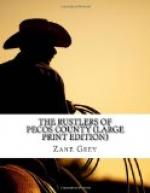“When he works at all, which sure ain’t often, he rides for Sampson.”
“Humph! Seems to me, Jim, that Sampson’s the whole circus round Linrock. I was some sore the other day to find I was losing good money at Sampson’s faro game. Sure if I’d won I wouldn’t have been sorry, eh? But I was surprised to hear some scully say Sampson owned the Hope So dive.”
“I’ve heard he owned considerable property hereabouts,” replied Jim constrainedly.
“Humph again! Why, Jim, you know it, only like every other scully you meet in this town, you’re afraid to open your mug about Sampson. Get me straight, Jim Hoden. I don’t care a damn for Colonel Mayor Sampson. And for cause I’d throw a gun on him just as quick as on any rustler in Pecos.”
“Talk’s cheap, my boy,” replied Hoden, making light of my bluster, but the red was deep in his face.
“Sure, I know that,” I said, calming down. “My temper gets up, Jim. Then it’s not well known that Sampson owns the Hope So?”
“Reckon it’s known in Pecos, all right. But Sampson’s name isn’t connected with the Hope So. Blandy runs the place.”
“That Blandy—I’ve got no use for him. His faro game’s crooked, or I’m locoed bronc. Not that we don’t have lots of crooked faro dealers. A fellow can stand for them. But Blandy’s mean, back handed, never looks you in the eyes. That Hope So place ought to be run by a good fellow like you, Hoden.”
“Thanks, Russ,” replied he, and I imagined his voice a little husky. “Didn’t you ever hear I used to run it?”
“No. Did you?” I said quickly.
“I reckon. I built the place, made additions twice, owned it for eleven years.”
“Well, I’ll be doggoned!”
It was indeed my turn to be surprised, and with the surprise came glimmering.
“I’m sorry you’re not there now, Jim. Did you sell out?”
“No. Just lost the place.”
Hoden was bursting for relief now—to talk—to tell. Sympathy had made him soft. I did not need to ask another question.
“It was two years ago—two years last March,” he went on. “I was in a big cattle deal with Sampson. We got the stock, an’ my share, eighteen hundred head, was rustled off. I owed Sampson. He pressed me. It come to a lawsuit, an’ I—was ruined.”
It hurt me to look at Hoden. He was white, and tears rolled down his cheeks.
I saw the bitterness, the defeat, the agony of the man. He had failed to meet his obligation; nevertheless he had been swindled.
All that he suppressed, all that would have been passion had the man’s spirit not been broken, lay bare for me to see. I had now the secret of his bitterness.
But the reason he did not openly accuse Sampson, the secret of his reticence and fear—these I thought best to try to learn at some later time, after I had consulted with Steele.
“Hard luck! Jim, it certainly was tough,” I said. “But you’re a good loser. And the wheel turns!




